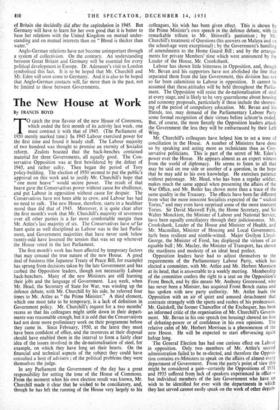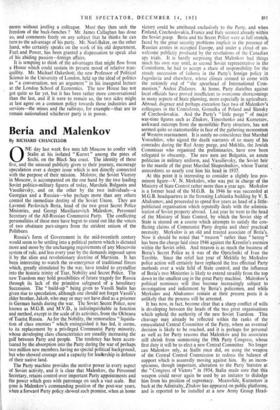The New House at Work
By FRANCIS BOYD
TO catch the true flavour of the new House of Commons, which ended the first month of its activity last week, one must contrast it with that of 1945. (The Parliament of 1950 merely marked time.) In 1945 Labour exercised power for the first time and found it heady stuff. The Labour majority of two hundred was thought to promise an eternity of socialist reform. Zealots boasted that the back-benches contained material for three Governments, all equally good. The Con- servative Opposition was at first bewildered by the defeat of 1945, and rather sulky. Then began the period of Tory policy-building. The election of 1950 seemed to put the public's approval on this work and to justify Mr. Churchill's hope that "one more heave" would secure power. The result of that heave gave the Conservatives power without cause for ebullience, and put Labour in opposition without cause for despair. The Conservatives have not been able to crow, and Labour has had no need to sulk. The new House, therefore, starts in a healthier mood than did that of 1945. Moreover, it is quite clear after the first month's work that Mr. Churchill's majority of seventeen over all other parties is a far more comfortable margin than Mr. Attlee's last majority of six. The Conservatives have so- far been quite as well disciplined as Labour was in the last Parlia- ment, and Government majorities that have never sunk below twenty-odd have lessened the tension that was set up whenever the House voted in the last Parliament. The first month's work has been affected by temporary factors that may conceal the true nature of the new House. A good deal of business (the Japanese Treaty of Peace Bill, for example) has sprung from decisions taken by the late Government and has curbed the Opposition leaders, though not necessarily Labour back-benchers. Many of the new Ministers are still learning their jol5s and the language of Government. Last week, when Mr. Head, the Secretary of State for War, was winding up the defence debate, with Mr. Churchill by his side, he referred four times to Mr. Attlee as "the Prime Minister." A third element, which one must take to be temporary, is a lack of definition in Government policy. Mr. Churchill's request for a two months' recess so that his colleagues might settle down in their depart- ments was reasonable enough, but it is odd that the Conservatives had not done more preliminary work on their programme before they came in. Since February, 1950, at the latest they must have been confident of office, and the resources at their disposal should have enabled them in the interval to form a fairly clear idea of the issues involved in the de-nationalisation of steel, for example, on which they have long set their hearts. On the financial and technical aspects of the subject they could have consulted a host of advisers; of the political problems they were themselves the judge. In any Parliament the Government of the day has a great responsibility for setting the tone of the House of Commons. From the moment when his own election result was known, Mr. Churchill made it clear that he wished to be conciliatory, and, though he has left the running of the House very largely to his colleagues, his wish has been given effect. This is shown by the Prime Minister's own speech in the defence debate, with its remarkable tribute, to Mr. Shinwell's patriotism; by Mr. Churchill's treatment of Questions (his answers on Malaya and on the school-age were exceptional); by the Government's handling of amendments to the, Home Guard Bill; and by the arrange- ments for private Members' time which were announced by the Leader of the House, Mr. Crookshank. Labour has shown little bitterness in Opposition, and, though Mr. Bevan and his supporters have not abolished the line that separated them from the late Government, this division has not so far been calamitous to Labour in opposition. It cannot be assumed that these.,attittides will be held throughout the Parlia- ment. The Opposition will resist the de-nationalisation of steel at every stage:and is likely to be very quarrelsome about housing and economy proposals, particularly if these include the shorten- ing of the period of compulsory education. Mr. Bevan and his friends, too, may demand of the Parliamentary Labour Party some formal recognition of their virtues before schism'is ended. But, of course, the more fiercely the Opposition leaders attack the Government the less they will be embarrassed by their Left Wing.. Churchill's colleagues have helped him. to set a tone of conciliation in The House. A number of Ministers have done so by speaking and acting -more as technicians than as Con- servative politicians. This is part of the secret of Mr. Eden's power over the House. He appears almost as an expert witness from the world of diplomacy. He seems .to listen to all that may be said on one side or another of a question, in the hope that he may add to his own knowledge. He exercises patience without patronage. Mr. Head, who has been a regular soldier, makes much the same appeal when presenting the affairs of the War Office, and Mr. Butler has shown more than a trace of the same quality in the Treasury. The effects have been far different from what the more innocent Socialists expected of the " wicked Tories," and may even have surprised some of the more innocent Tories. Sir David Maxwell Fyfe, the Home Secretary, and Sir Walter Monckton, the Minister of Labour and National Service, have been equally conciliatory through their judiciousness. Mr. Crookshank, Leader of the House and Minister of Health, and Mr. Macmillan, Minister of Housing and Local Government, ha/e been resilient and nimble-witted. Major Gwilym Lloyd- George, the Minister of Food, has displayed the virtues of an equable bull ; Mr. Maclay, the Minister of Transport, has shown the manliness and modesty of an ideal head prefect. Opposition leaders have had to adjust themselves to the requirements of the Parliamentary Labour Party, which has elected a committee, with Mr. Attlee and Mr. Herbert Morrison at its head, that is answerable to a weekly meeting. Membership of the committee confers the right to a seat on the Opposition's Front Bench, and by this means Mr. Anthony Greenwood, who has never been a Minister, has acquired Front Bench status and has spoken with new party authority. Mr. Attlee leads the Opposition with an air of quiet and amused detachment that contrasts strangely with the spurts and rushes of his predecessor. Mr. Gaitskell, the former Chancellor of the Exchequer, has been an informed critic of the organisation of Mr. Churchill's Govern- ment. Mr. Bevan in his one speech (on housing) showed no loss of debating-power or of confidence in his own opinions. The relative calm of Mr. Herbert Morrison is a phenomenon of the new House. He will be expected to start effervescing again• befolt long. The General Election has had one curious effect on Labour in opposition. Only, two members of Mr. Attlee's second administration failed to be re-elected, and therefore the Opposi- tion contains ex-Ministers to speak on the affairs of almost every department of Government. From the party's point. of view this might be considered a gain—certainly the Oppositions of 1931 and 1935 suffered from lack of speakers experienced in office— but individual members of the late Government _who have nO wish to be identified for ever with the departments in which they last served cannot easily speak on the work of other depart- meats without jostling a colleague. Must they then seek the freedom of the back-benches ? Mr. James Callaghan has done so, and comments freely on any subject that he thinks he can turn to the advantage of his party. Mr. Noel-Baker, on the Other hand, who certainly speaks on the work of his old department, Fuel, and Power, has been granted a dispensation to speak also of his abiding passion—foreign affairs.
It is tempting to think of the advantages that might flow from a House which could sustain its present mood of relative tran- quillity. Mr. Michael Oakeshott, the new Professor of Political Science in the University of London, held up the ideal of politics as "a conversation, not an argument" in his inaugural lecture at the London School of Economics. The new House has not got quite so far yet, but it has been rather more conversational than the last, and if it were to remain so, the two sides might at last agree on a common policy towards those industries and services—the mines and the railways, for example—that are to remain nationalised whichever party is in power.







































 Previous page
Previous page